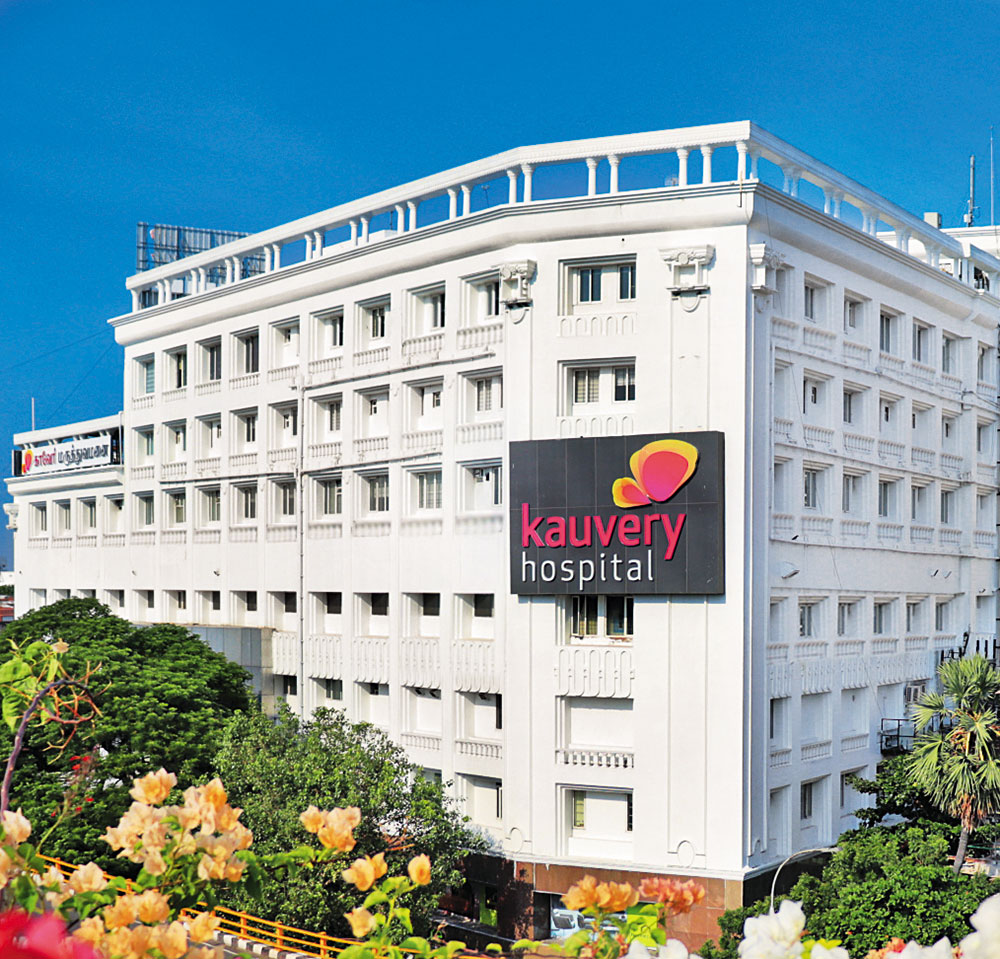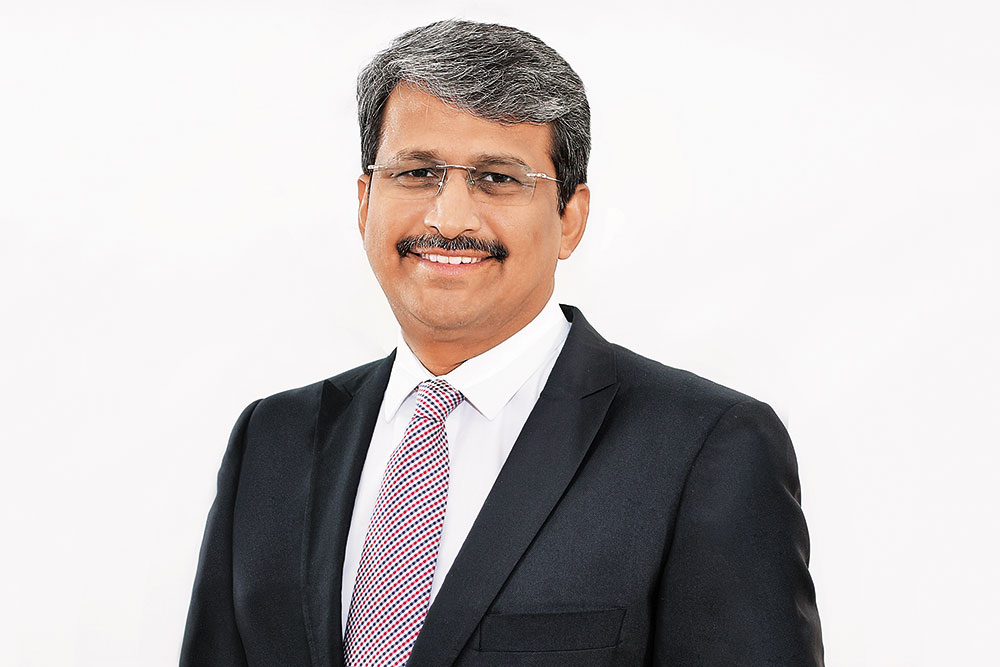Excerpts:
How has Kauvery Hospital positioned itself in the health sector?
It is one of the few corporate hospitals promoted by doctors and run by doctors. I feel it is one of our USPs. Our core pillars: high standards of ethics- we don’t order unwanted investigations, medicines, or admissions.
The second pillar is cost: since we come from a tier-II city, we understand the cost of treatment for the patients, especially since we cater to people of lower social-economic strata. We have built-in systems and processes that ensure that patient charges are appropriate and wherever possible the costs are reduced. The patients well appreciated us for such principles in whichever cities we have set up our hospitals.
The third core pillar is the personal touch. Trichy is a small town; we were born and brought up here, and everyone knows each other and their families. So personal touch came here as a default. The challenge was replicating in different places with appropriate communications at the proper time. When we say personal touch, it means the engagements the hospital, doctors and staff make with the patient and the attendants. They have to be appropriately educated according to the status and the outcome scenarios.
The three core pillars have helped us position Kauvery Hospital differently from any other corporate hospital. There is a perception that hospitals have lost the personal touch. Offering ethical care and where patients are engaged at a personal level is our USP. All the ICU patients’ daily interactions with doctors are video recorded and audited to check if the personal engagements were maintained by communicating the status and treatment outcome of the patient appropriately.
Our mission is to make great healthcare affordable
You have focused the services only in Tamil Nadu. Kindly share how you plan to reach out to other parts of the state and the country.
We started in 1999 with 39 beds in Trichy (Tamil Nadu). In the initial 10 years, we had one 200 bedded hospital. Later we acquired one more public limited hospital, and that was when we also received private equity investment. The hospital has generated a turnover of about Rs 1000 crore in the last 22 years.
We have two investors on board. They brought in cash for expansion and professionals to improve the set-up. It helped us expand to the current presence status in Chennai, Trichy, Hosur, Salem, Bengaluru and Tirunelveli with 1500 beds. We have a total of 4000 employees and 500 doctors working with us.
We are expanding Bengaluru with one more hospital.
I feel a pan-India presence is desirable but not practical as of now. We will grow as a regional player. Our expansion will be in South India. Soon we will have an expansion of hospitals in a few more cities in Tamil Nadu; in Salem, we have a 150 bed hospital, and we want to make it 350 beds. In Chennai, we want to add two more centres to the existing one.
In the next five years, we want to expand in the current geography and Bengaluru. But we do cater to patients from other parts of the country. With the new tele-medicine norms and patients’ acceptance we are able to extend quality care virtually.

What challenges did your hospital face in developing it into its current position?
Getting qualified staff in various departments like nurses, paramedics and specialist doctors was challenging. For the first five years, we could not get a qualified cardiologist. The trust and confidence which the brand has built with excellent patient outcomes is now attracting top quality talent
Training and upskilling the staff was difficult. Students coming out of college are not employable. So we set up a comprehensive hands-on internal training program, including patient communication modules. We set up a nursing college, a paramedical college, and an online learning application. It helped fresh graduates to get training, go through rigorous evaluation programs and were employable within 2-3 months.
Finance was a big challenge. We all came from middle-class families, first-generation doctors and entrepreneurs.
Where do you see Kauvery Hospital in India as a destination for Health Tourism?
We are exploring it but are not dependent on it. We offer world-class tertiary care services like heart , lung, liver, kidney, and bone marrow transplants, so we feel it is time to attract medical tourism.
Already patients have started to come from West Bengal, Assam and other North Eastern states.
What unique facilities are provided to patients in your hospitals?
We offer a transparent billing mechanism that is very much appreciated. During the pandemic, we began telemedicine, and now we provide teleconsultations in India and abroad. During Covid, many NRIs in the US and UK benefited from our teleconsultation services, as getting an appointment was difficult in those countries. We want to refine it further to help them post-pandemic and use the same strategy for the North East. They can do pre and post consultation. They need not to travel here and only visit us for admission if required. Post-discharge care is also provided with 90 days follow up with a dedicated team. We have homegrown software to provide the high-quality service for post-surgery and high-risk patients.
Can you tell us about the educational programs offered by Kauvery Hospital?
We had a nursing college set up in 2007 that offered gave a diploma in nursing; later, BSc and MSc nursing were offered. It also provides 15 paramedical courses from MGR University. We also provide one-year courses from the local university. Sponsors are identified for candidates from low-income families; they are given training here and upon successful completion we recruit them. Such candidates are doing extremely well. We also offer on the job training for nurses which offers flexible timings. Our institution provides 10 postgraduate courses, and about 70-80 postgraduates will pass out in the next few years. Since the government has relaxed the norms, we will be applying for 10 more courses.
How can government further promote the efforts of hospitals like yours?
India needs a huge number of trained skilled nurses and hence need world-class nursing colleges. Nursing college norms need to be relaxed. Paramedical courses need to be streamlined with a central authority, a common exam, and a central recruitment agency; India will not have a paramedic shortage if the government looks into it. Government should encourage setting up private hospitals in tier-II and tier-III cities. So many incentives are being offered to attract investments into infrastructure. A special single-window clearance for just setting up hospitals would hasten the medical infrastructure development in the country. Tamil Nadu has done extremely well in setting up government hospitals.











